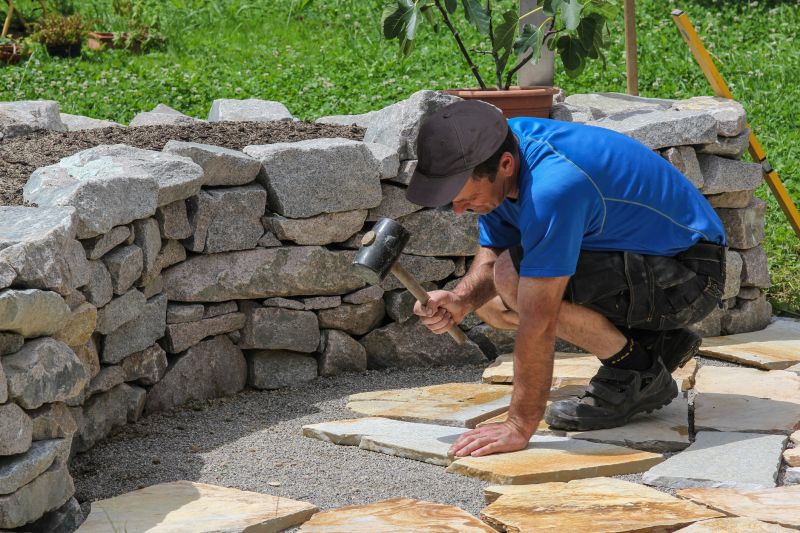Top Masonry Service Products For Professional Results
Explore the essential tools and supplies that help masonry experts deliver durable and precise workmanship every time.
 Masonry services require a diverse array of products to ensure quality, safety, and efficiency in construction and repair projects. From foundational tools to finishing supplies, selecting the right equipment can significantly impact the outcome of masonry work. Professionals and DIY enthusiasts alike seek reliable, durable, and versatile products to handle tasks such as bricklaying, stone setting, and concrete work. In Edgewater, MD, a region with a rich history of masonry craftsmanship, choosing appropriate supplies is essential for maintaining standards and achieving desired results.
Masonry services require a diverse array of products to ensure quality, safety, and efficiency in construction and repair projects. From foundational tools to finishing supplies, selecting the right equipment can significantly impact the outcome of masonry work. Professionals and DIY enthusiasts alike seek reliable, durable, and versatile products to handle tasks such as bricklaying, stone setting, and concrete work. In Edgewater, MD, a region with a rich history of masonry craftsmanship, choosing appropriate supplies is essential for maintaining standards and achieving desired results.
Top Overall Option
Multi-Purpose Masonry Tool Set
A comprehensive masonry tool set that includes various trowels, chisels, and joint tools designed for versatility and durability. Crafted from high-quality materials, this set supports a wide range of masonry tasks, from bricklaying to stone shaping, offering reliability and ease of use for professionals and DIYers alike.
Types of Products For Masonry Service
Brick Trowels
Essential for applying and spreading mortar, brick trowels come in various sizes and shapes to accommodate different masonry tasks.
Pointing Trowels
Used for detailed mortar work and finishing joints, pointing trowels help achieve clean, precise lines.
Chisels and Hammers
A variety of chisels and hammers are necessary for shaping stones and breaking materials during masonry projects.
Masonry Saws
Power saws designed for cutting bricks, stones, and concrete blocks with accuracy and efficiency.
Jointing Tools
Tools specifically designed for finishing and smoothing mortar joints to ensure a professional appearance.
Level and Plumb Tools
Levels, plumb bobs, and laser levels help ensure structures are properly aligned and level.
Mortar Mixers
Equipment used to mix mortar consistently, saving time and ensuring uniform consistency.
Safety Gear
Including gloves, goggles, masks, and helmets, safety gear is vital for protecting workers during masonry tasks.
Sealants and Waterproofing
Products used to protect masonry surfaces from water infiltration and weather damage.
Cleaning and Surface Prep Tools
Brushes, grinders, and cleaning solutions to prepare surfaces and maintain masonry work.
Concrete Mixers
Portable mixers for preparing concrete and mortar on-site with consistent quality.
Forming and Shoring Equipment
Supports for shaping and supporting structures during curing and construction phases.
Anchors and Fasteners
Hardware used to secure masonry units and structural elements together.
Popular Choices
Widely used for spreading mortar and laying bricks, appreciated for their balance and durability.
Favored for detailed joint work and finishing touches in masonry projects.
Popular for shaping and splitting stones, offering strength and precision.
Portable saws that provide flexibility and ease of use for cutting bricks and stones.
Trending for their accuracy in ensuring level and plumb lines across large surfaces.
Convenient for small batch mixing and on-the-spot mortar preparation.
Popular safety gear to protect hands from sharp tools and rough materials.
Commonly used to waterproof masonry surfaces and extend their lifespan.
Effective for cleaning and preparing masonry surfaces before application or finishing.
Favored for their mobility and efficiency in small to medium projects.
Popular for shaping concrete and ensuring proper support during curing.
Widely used for securing masonry units and structural components.
The array of products available for masonry services includes various hand tools, power tools, safety gear, and materials. Proper selection not only enhances productivity but also promotes safety on the worksite. Whether working on small repair projects or large-scale constructions, having access to a comprehensive set of products tailored to masonry needs can make a significant difference. This guide aims to highlight key product categories and considerations to help you make informed choices for your masonry endeavors.
Durability and precision are critical factors in selecting masonry tools and supplies. High-quality materials resist wear and provide consistent performance over time. Additionally, ergonomic design features can reduce fatigue during extended use, contributing to safer and more efficient work. By understanding the different types of products and their specific applications, you can better equip yourself for successful masonry projects in Edgewater, MD, and beyond.
Investing in the right products for masonry service ensures that work is completed with accuracy and safety. From foundational equipment to finishing touches, the right supplies support craftsmanship and help achieve professional-looking results. Whether you are a seasoned mason or a homeowner tackling a renovation, choosing suitable products tailored to your specific needs can streamline your project and improve overall satisfaction.
Key Buying Considerations
- Material quality and durability of tools to withstand frequent use.
- Compatibility of tools with specific masonry materials such as brick, stone, or concrete.
- Ergonomic design features to reduce fatigue during prolonged work periods.
- Ease of cleaning and maintenance to prolong tool lifespan.
- Safety features and protective gear to ensure worker safety.
- Availability of replacement parts and accessories for ongoing projects.
- Weight and size of power tools for maneuverability and ease of use.
- Versatility of multi-purpose tools to handle various tasks.
- Brand reputation and customer reviews for reliability insights.
- Compatibility with existing equipment and workspace constraints.
- Cost-effectiveness balancing initial investment with long-term use.
- Availability of warranties or service support.
- Environmental conditions of the worksite, including weather and space limitations.
- Specific project requirements such as size, scope, and complexity.
- Compliance with local safety standards and regulations.
